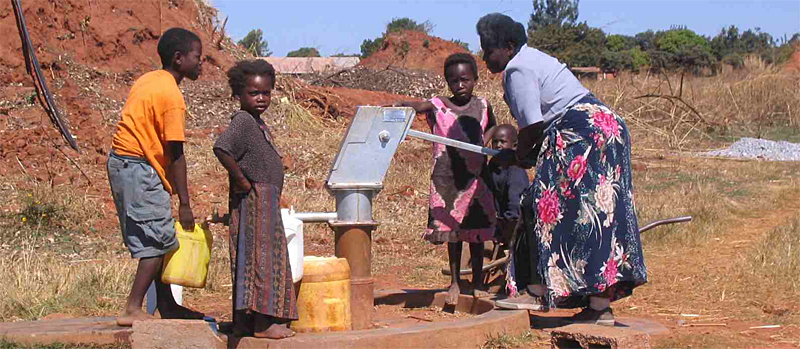Lifewater in Africa
COPYRIGHT © 2010 BY JEFF BJORCK. ALL RIGHTS RESERVED. REPRODUCTION WITHOUT PERMISSION IS PROHIBITED.
As one of Lifewater’s Board members, I value the opportunity to survey the ongoing impact of our ministry in the field. I made one such trip In June of 2006, when I traveled to Zambia. Nothing flames my passion for this work like actually spending time both with those who do the work and those who receive the benefits. My time in Zambia reminded me once again of how much we take for granted in the United States. We quickly quench our thirst with the turn of a faucet, manage sanitation needs with the instant flush of a toilet, and maintain good hygiene with inexpensive, readily available soap and safe water. For much of the world, however, while waterborne diseases and death are readily available, these things we call “conveniences” are not. In response, Lifewater offers tangible hope in Jesus’ name to those who otherwise have none. This hope comes in the form of training, equipping, and empowering local partners (e.g., nonprofit organizations, churches, etc.) so they can provide safe access to water, sanitation, and hygiene. As such, Lifewater “trains trainers to train” as its chief community development strategy, with a focus on access to safe Water, Sanitation, and Hygiene education (WASH).
On this particular trip, I first spent time in and around Ndola (northern Zambia) and then traveled south to Lusaka, Zambia’s capital. In Ndola, I was hosted by one of Lifewater’s partners, Seeds of Hope International partners (SHIP). We surveyed a variety of their excellent projects currently in process. At that time, SHIP was engaged in manufacturing bio-sand filters, drilling wells, repairing pumps, and conducting hygiene trainings. Whereas Lifewater provided much of the early
WASH training for SHIP, they are a fully independent organization with whom Lifewater is proud to partner, and they also focus in other areas such as literacy classes for rural women. Without safe access to water, girls (and thus women) in outlying areas typically remain illiterate because they need to spend their days walking miles to obtain water. Thus, water can bring benefits beyond those that might be readily apparent! In just a few short years, SHIP has sponsored hygiene trainings where literally thousands of school children have been instructed. Children then carry this new knowledge home to parents who are less embarrassed to learn from their children than from health officials. Indeed, this Lifewater Partner is clearly sowing “seeds of hope!”
I then traveled to Lusaka, where I participated in the Lifewater 2006 African partners Conference presented by Lifewater staff. While there, I had the privilege of coming to know amazing individuals from Zambia, Uganda, Tanzania, Mozambique, Kenya, and Ethiopia. The first four conference days were packed with participatory activities focused on community development, new training strategies, and technology updates. This was followed with three post-conference days focused on empowering the partners with new ways to promote safe sanitation in their communities. I interviewed each of the partners and found myself repeatedly overwhelmed by their stories and by their commitment to serve their communities.
Please go back with me to 2006 and read on to learn their stories and much more! The story that follows was written back in 2006, but much of it still provides a very current look at what Lifewater strives to accomplish. You will be inspired to see how much good can be done for so little when people have a vision for safe water and a heart to serve!


